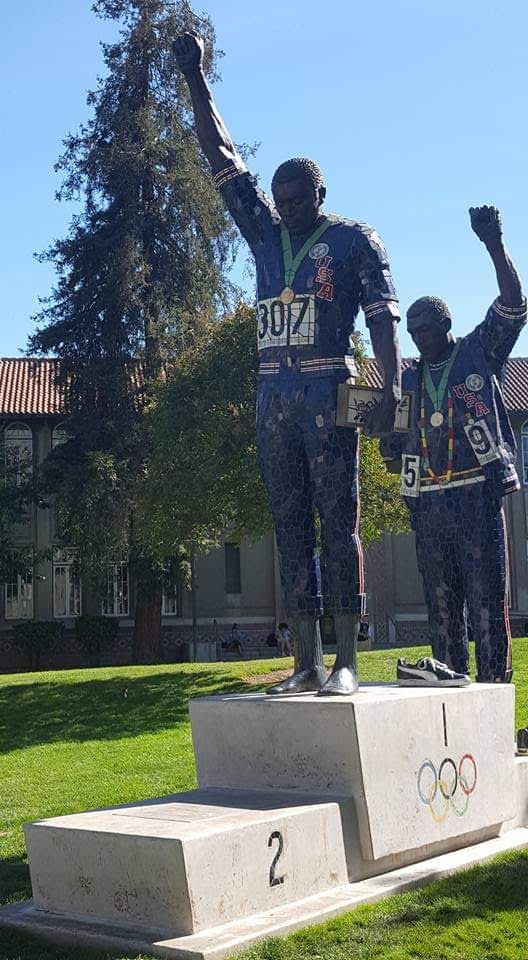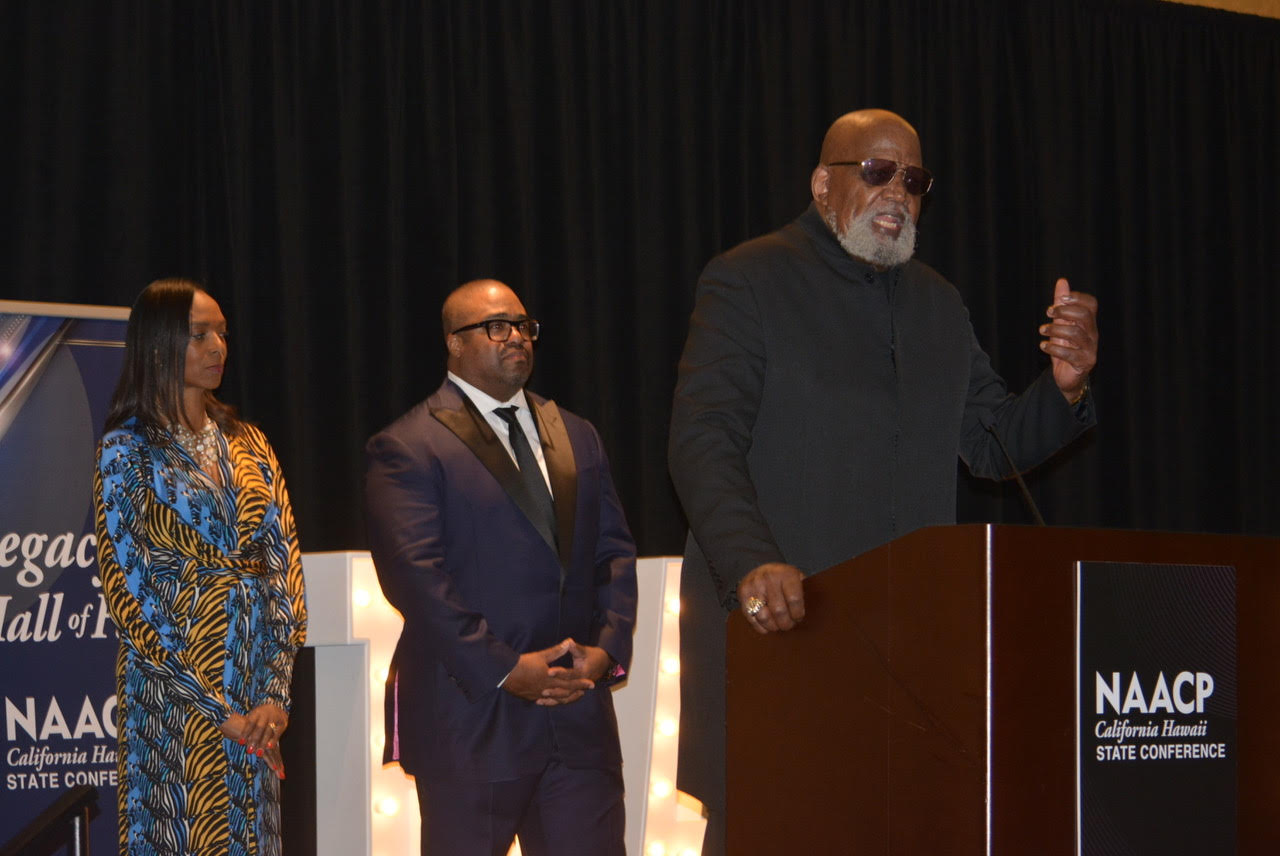
By Antonio Ray Harvey, California Black Media
The California Hawaii State Conference of the National Association for the Advancement of Colored People (CA/HI NAACP) held its 11th annual Legacy Hall of Fame induction ceremony. The event took place on June 24 at the Sheraton Hotel in downtown Sacramento.
At the event, the NAACP paid tribute to 1968 Olympic medalists Dr. Tommie Smith and Dr. John Carlos, and 1967 Olympic Project for Human Rights co-organizers Dr. Harry Edwards and Dr. Kenneth Noel. These men were honored for their contributions to the civil rights movement in the 1960s.
All the honorees except Smith were present at the ceremony. Smith’s friend Darrell Goode accepted the award on his behalf.
“If you receive this award, it exemplifies greatness of your career whether it’s in politics, whether it’s in business, or whether it be activism,” said Rick Callender, President of the CA/HI NAACP.
“I’m sure you can see why now our current inductees are receiving this honor. It just shows you what an incredible impact they had on the lives of everyone in their fight for civil rights,” he added.
After placing first and third in the 200-meter dash at the Olympic Games in Mexico City, sprinters Smith and Carlos ascended the medal stand to receive their respective gold and bronze metals with second-place silver medalist Peter Norman of Australia. During that historic moment, the men led a protest to draw attention to racial discrimination and other negative conditions affecting Black people in America and across the globe.
Shoeless, donning black socks to represent Black poverty, and wearing beads to protest violence against African Americans, the athletes raised a black-gloved fist to show support for Black and oppressed people. Smith wore a black scarf around his neck to show Black pride.
The iconic image of their stance on the podium and their bold display of the Black power movement’s most recognizable symbol (the raised fist) was seen around the world. That moment changed the racial dynamics of international sports forever.

After their stand against racial injustice, Smith and Carlos never relinquished their medals even though the International Olympic Committee (IOC) prohibits protests at the games. They were immediately asked to leave the games in Mexico City.
Carlos said it was a widespread myth for decades that the IOC took his and Smith’s medals.
“They never took our medals. It was pure propaganda,” Carlos told California Black Media. “They were saying for years that they took our medals but what it really was a fear factor. They said it to try to instill fear into every Black athlete after 1968.”
Carlos, Smith, Edwards and Noel were associated with San Jose College’s track and field team in the mid-1960s. Facing discrimination as students on the campus, Edwards and Noel orchestrated rallies, protests and social justice events to attract African American student-athletes and fellow campus activists.
Noel and Edwards started The United Black Students for Action (UBSA). They both noticed that Black student-athletes could use their fame to elevate civil rights issues. They both converted UBSA into the Olympic Project for Human Rights (OPHR), a civil rights organization created to boycott the 1968 Summer Olympics.
On Oct. 16, 1968, Smith won the 200-meter race in a world-record time of 19.83 seconds. Norman finished second with a time of 20.06 seconds, and Carlos was third with a time of 20.10 seconds.
“There were several other people who were really important in our lives and involved in the struggle too,” said Noel, who was known as a gifted middle-distance runner. “One of the things that I will say about the fight for human rights is we endeavored to change the paradigm of what it means to be a champion athlete. Not only to perform on the field but to get involved in politics, and support activities in our communities.”
Edwards, an emeritus professor of Sociology at the University of California Berkeley, and former scholar-athlete at San Jose State College (today San Jose State University), encouraged African American athletes to protest the 1968 summer Olympics in Mexico City with the support of the Project for Human Rights.
Edwards, a long-time consultant at the San Francisco 49ers, is a proud and committed social activist.
In 2016, Edwards supported then-49ers quarterback Colin Kaepernick’s controversial protest against excessive use of force by police officers.
Kaepernick took a knee during the playing of the National Anthem before each game, as a way of bringing attention to police brutality against Black people in the United States.
After the first time Kaepernick kneeled, Edwards told him to give him his uniform immediately because his action would be a monumental moment in sports and representative of the new wave of civil rights. Edwards sent the garment to the National Museum of African American History and Culture in Washington, D.C., alongside Carlos, Smith, and Muhammad Ali’s exhibits.

Shown left to right at the CA/HI NAACP Legacy Hall of Fame ceremony, Darrell Goode (received award for Dr. Tommie Smith), Rick Callendar (CA/HI NAACP president), Dr. John Carlos (Legacy Hall of Fame recipient), Dr. Kenneth Noel (Legacy Hall of Fame recipient), and Dr. Harry Edwards (Legacy Hall of Fame recipient). Dr. Tommie Smith, a gold medalist in the 1968 Olympics, could not attend the induction ceremony in Sacramento. June 24, 2023. CBM photo by Antonio Ray Harvey.
“He felt strong enough about it to put his career and life on the line. Look at the number of death threats and other things that happened to him. He put it all on the line in order to make that statement,” Edwards said. “He was saying we are better than this. He started a movement that swept the world.”
The Legacy Hall of Fame honors outstanding community leaders who have fought tirelessly to advance the civil rights movement while also creating vital funding for local unit capacity building, youth leadership programs, and NextGen Leadership programs and initiatives, according to the CA/HI NAACP.


